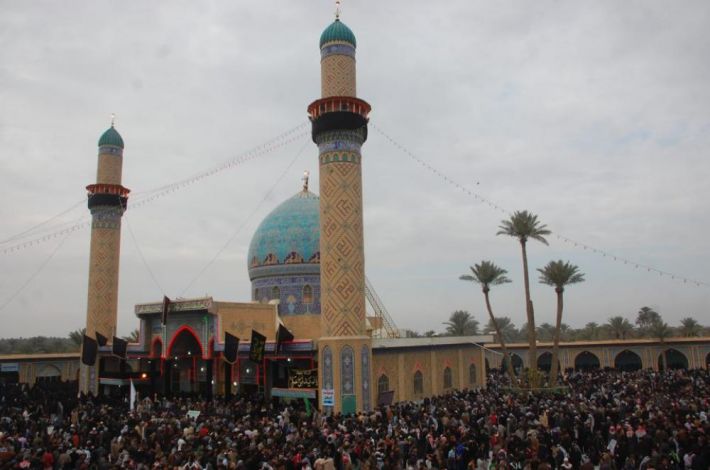On the third of Safar 121 AH was the martyrdom of the killed and crucified Abu Al-Hussayn Zayd Ash-Shaheed [The martyr] son of Imam Ali As-Sajjad son of Imam Aba Abdillah Al-Hussayn son of the Commander of the Faithful Ali son of Abi Taleb (Allah's prayers be upon them all), whose shrine is located in the province of Babylon, Kifl village that is far 30 kms of Kufa.
He (peace be upon him) was born in the year 57 AH, and grew up in the House of prophecy in the lap of his father Imam Zayn Al-'Abideen (peace be upon him) learning from him, and some narrations stated that his name was given by the Messenger of Allah (Allah's prayers be upon him and his holy Household). He was given the title of "Haleef Al-Quran" [the ally of the Quran] as he was permanently performing Quran and reading his prayers in the Masjid.
As narrated by Imam Al-Hussayn: "The Holy Prophet put his sacred hand on my back and said: 'O Hussayn, it will not be long until a man will be born among your descendants. He will be called Zayd; he will be killed as a martyr. On the day of resurrection, he and his companions will enter heaven, setting their feet on the necks of the people.'"
Historians recorded that when Hisham ibn Abdu'l-Malik became the caliph, he committed many atrocities. With regard to the Bani Hashim, he was particularly cruel. At last, Zayd ibn Ali, well known as a great scholar and a pious theologian, went to see the caliph to seek redress for the grievances of the Bani Hashim.
As soon as Zayd arrived, the caliph, instead of greeting him as a direct descendant of the prophet, abused him with such abominable language that it can not be repeated. Because of this disgraceful treatment, Zayd left Syria for Kufa, where he raised an army against the Bani Umayyad.
The governor of Kufa, Yusuf ibn 'Umar Thaqafi came out with a huge army to face him. Zayd recited the following war poem: "Disgraceful life and honourable death: both are bitter morsels, but if one of them must be chosen, my choice is honourable death." Although he fought bravely, Zayd was killed in battle at the age of forty-two by Yusuf ibn 'Amr al-Thaqafi (the Umayyad governor).
His son, Yahya, took his body from the field and buried him away from the city near the river bank, causing the water to flow over it. However, the grave was discovered and, under Yusuf's orders, the body was exhumed, Zayd's head was cut off and sent to Hisham in Syria. In the month of Safar, 121 A.H., Hisham had the sacred body of this descendant of the Prophet placed on the gallows entirely naked. For four years the sacred body remained on the gallows. Thereafter, when Walid Ibn Yazid ibn Abdu'l-Malik ibn Marwan became caliph in 126 A.H., he ordered that the skeleton be taken down from the gallows, burnt, and the ashes scattered to the wind.
This accursed man committed a similar atrocity to the body of Yahya ibn Zayd of Gurgan (or Jowzjan). This noble man also opposed the oppression of the Bani Umayyad. He too was martyred on the battlefield. His head was sent to Syria and, as in the case of his revered father, his body was hung on the gallows - for six years. Friend and foe alike wept at the sight. Waliu'd-din Abu Muslim Khorasani, who had risen against the Bani Umayyad on behalf of Bani 'Abbas, took his body down and buried it in Gurgan (or Jowzjan).
